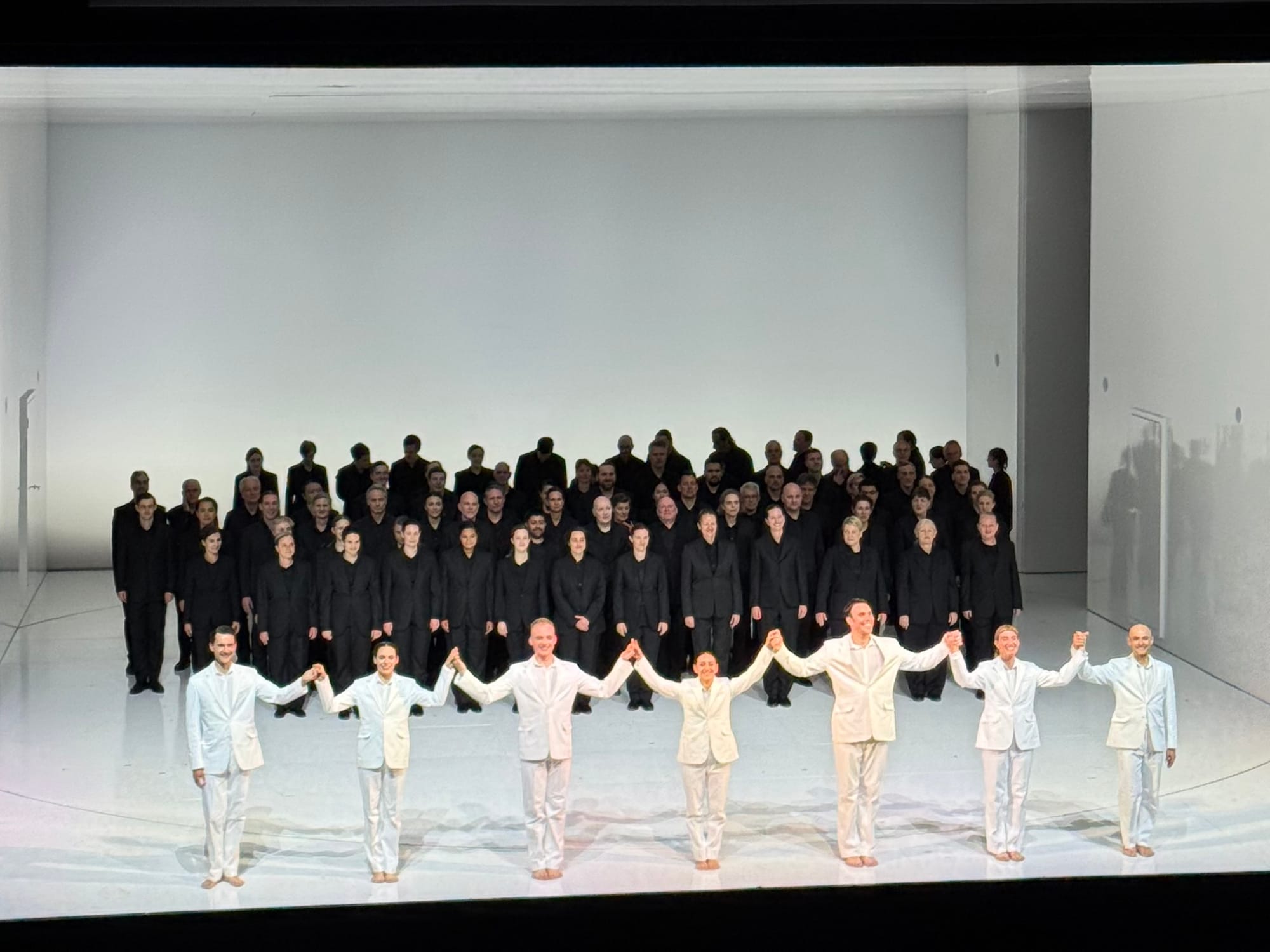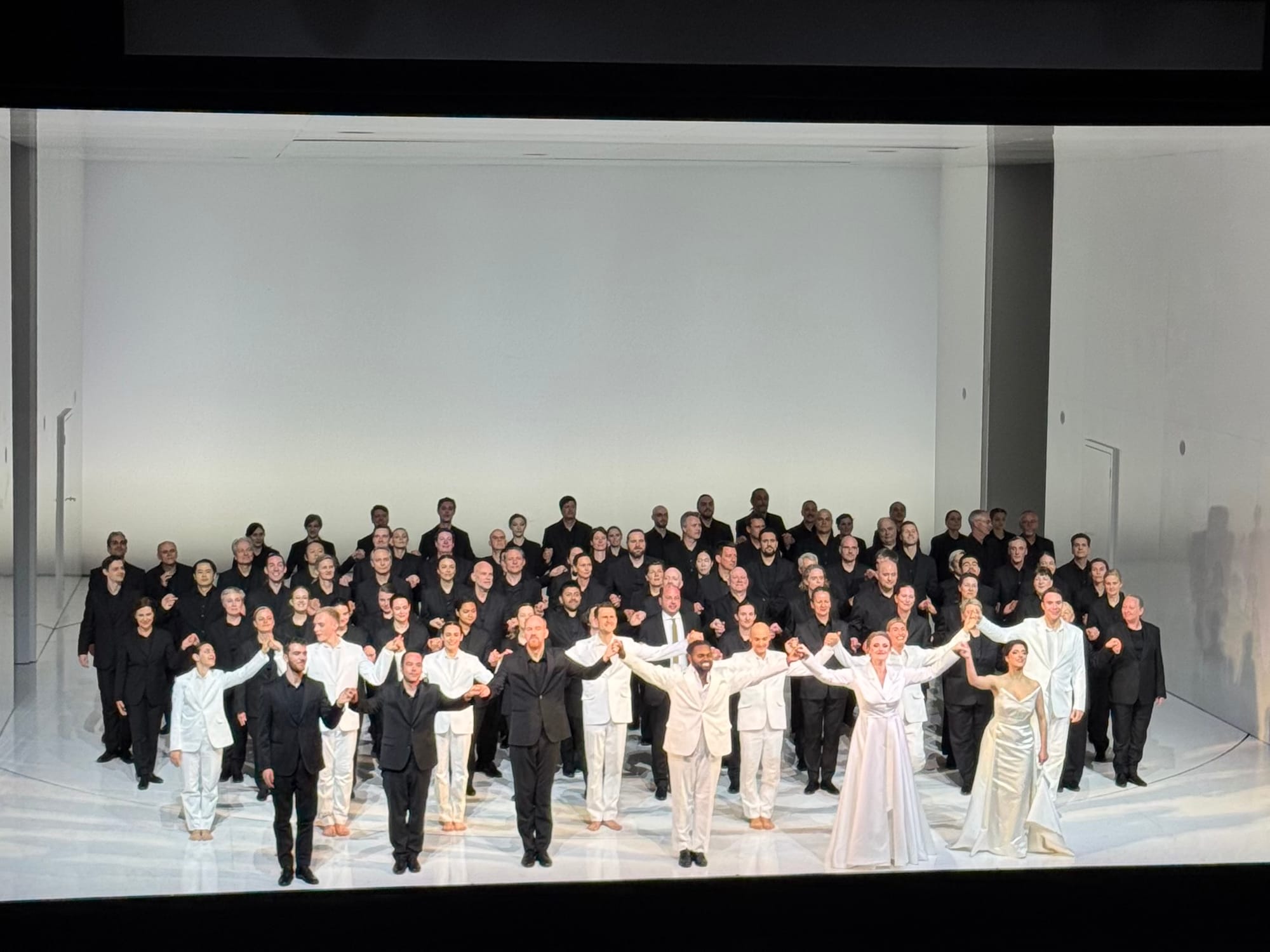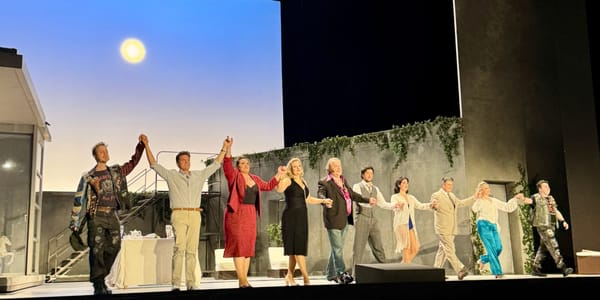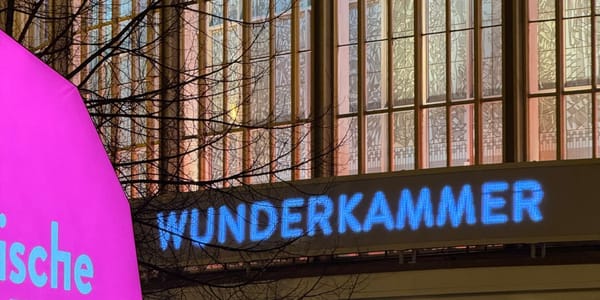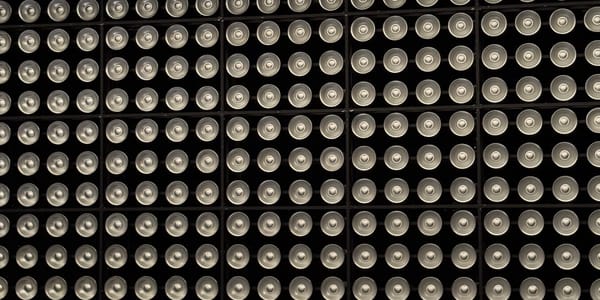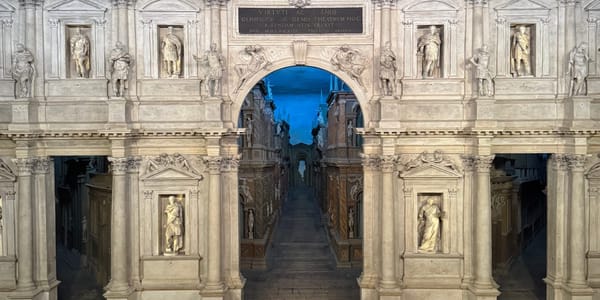Echnaton (Akhnaten) at Komische Oper Berlin
A hypnotic fever dream of ritual, power, and collapse—where minimalist music, dazzling visuals, and mythic symbolism explore what happens when change is forced faster than a society can absorb.
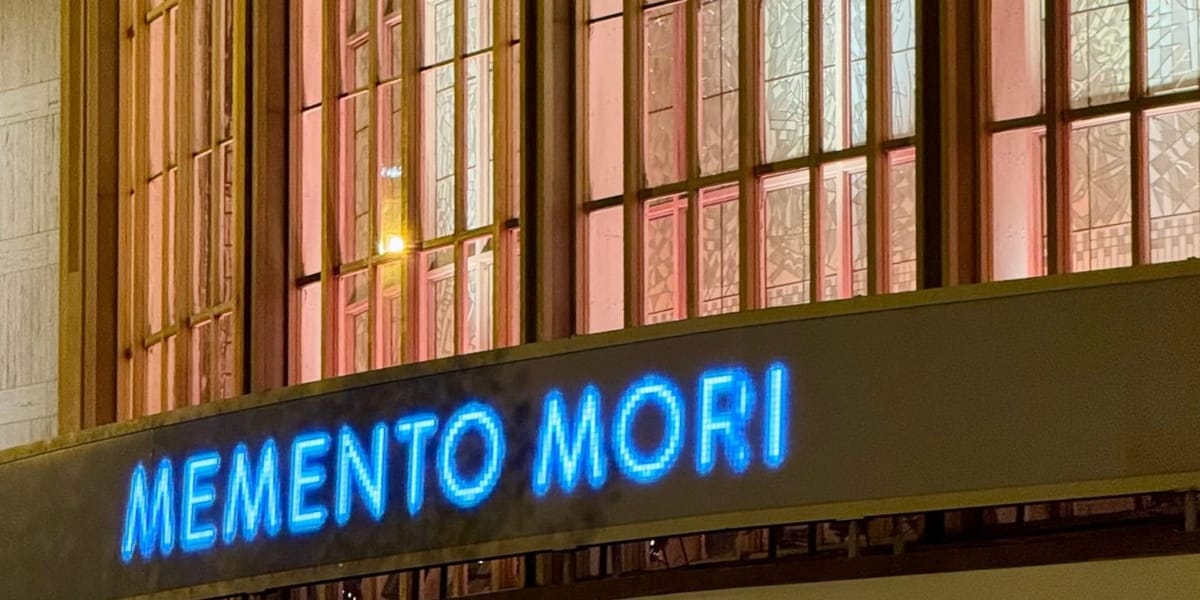
🎭 Echnaton (Akhnaten)
🎶 Philip Glass, 1984
💭 Barrie Kosky, 2025
🏛️ Komische Oper Berlin
🗓️ 20.04.2025
"HERE WE SEE AKHNATEN FOR THE FIRST TIME AS THE REBEL HE WAS, VENTING HIS HATRED OF THE OLD ORDER"
What happens when the divine becomes political—and when politics turns divine? Komische Oper’s production of Philip Glass’s Echnaton (Akhnaten) doesn’t seek to answer this question so much as stage it in slow, ritualized motion. In a hypnotic swirl of minimalist music, stark visual symbolism, and stylized choreography, we witness not a history lesson, but a parable: a society restructured from the top down, a ruler transformed into a god, and a new order crumbling under its own absolutism.
Glass’s opera, the final part of his portrait trilogy, explores radical figures who reshaped science, politics, and religion. But in Echnaton, religion is inseparable from power—it is a tool, a weapon, and a symbol of rupture. This production embraces that ambiguity, stripping away archaeological literalism to reveal something darker and more universal: the seduction of control, the danger of haste, and the price paid when ideology demands obedience.
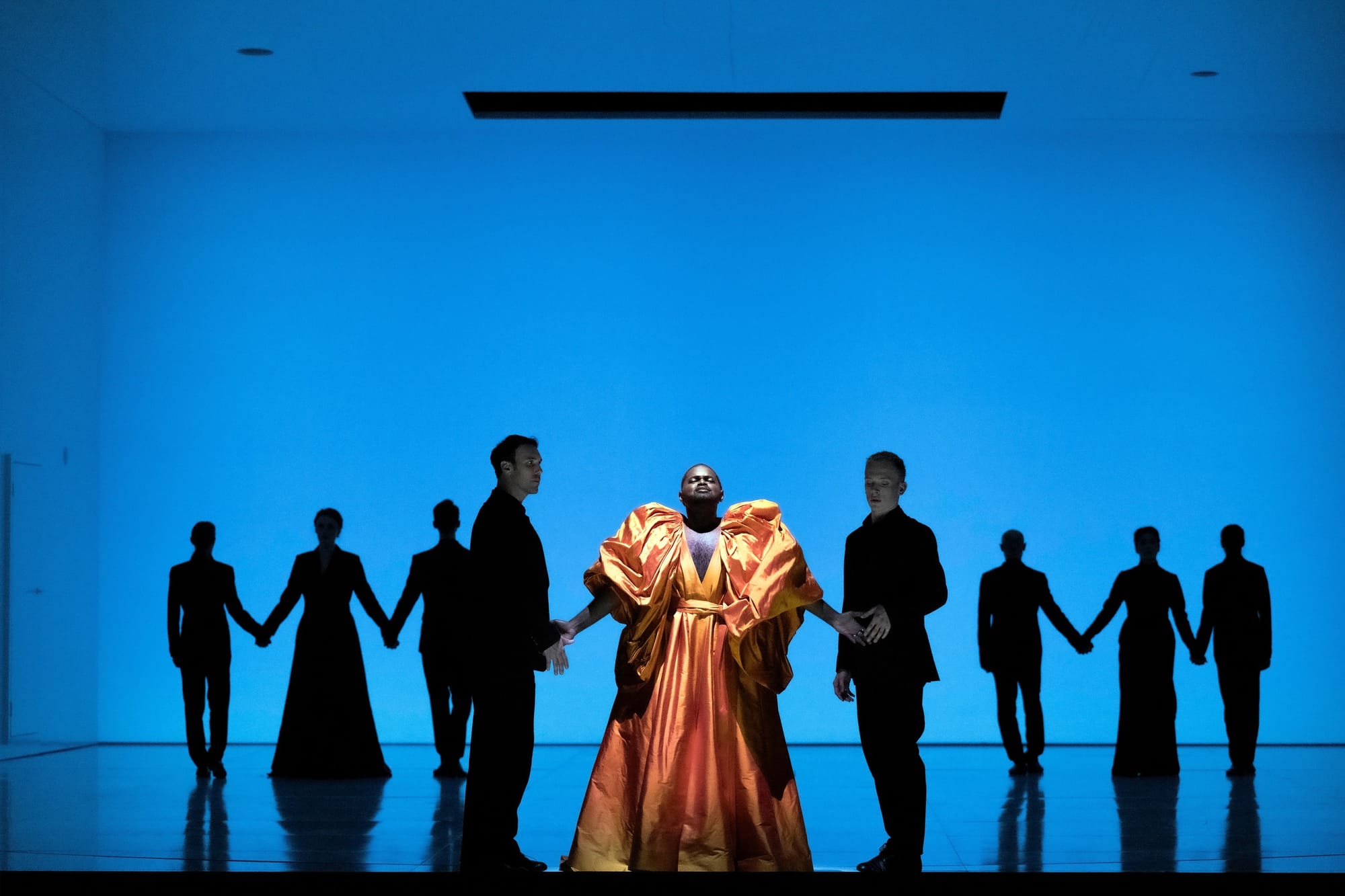
The Man, the Myth, the Monotheist
Echnaton is the final piece in Glass’s operatic triptych exploring pivotal figures of science, politics, and religion—following Einstein on the Beach and Satyagraha featuring Ghandi. Yet, while ostensibly focused on religion, Echnaton feels more like an exploration of political power dressed in spiritual garb. Historically, Akhnaten’s reign marked a radical upheaval of ancient Egyptian tradition: polytheism was abolished, the Sun God Aton became the singular deity, and only the Pharaoh and his wife maintained direct access to this divine force. Priestly classes were rendered obsolete, political structures were dismantled, and a new capital rose from the desert.
Glass’s opera doesn’t strive for historical accuracy so much as symbolic resonance. The plot loosely traces Akhnaten’s rise, reign, and fall, but avoids linear storytelling in favour of ritualized tableaux. The dramatic apex—a violent overthrow of the royal couple by an enraged mob—has no concrete historical backing, serving rather as a metaphor for the consequences of sweeping societal change imposed without regard for tradition or lived reality.
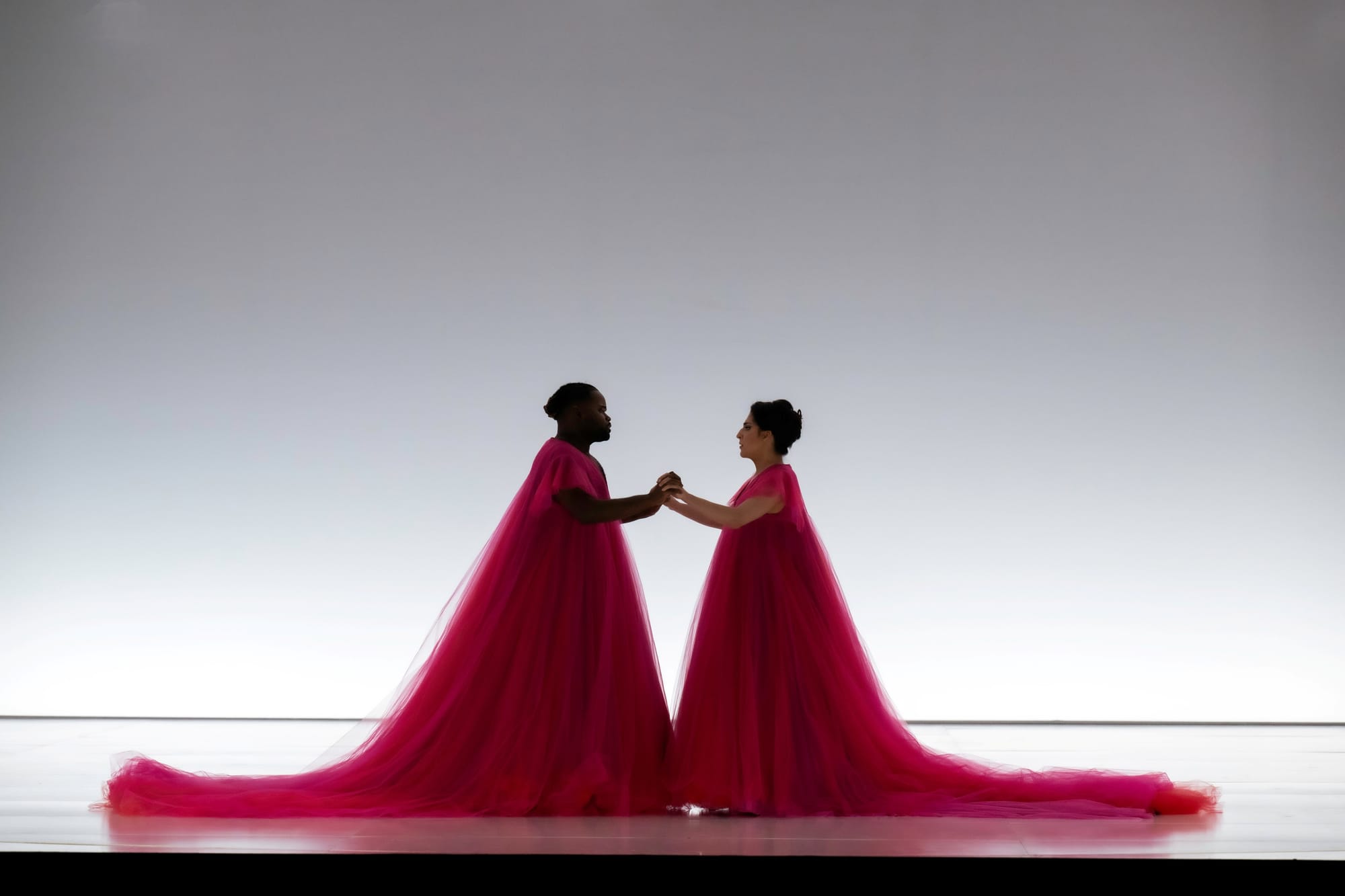
Minimalism as Ceremony
This was my first encounter with minimal music in a live setting, and Glass’s score doesn’t guide with melodic arcs or emotional climaxes; it envelops with repetition. Looped motifs pulse and expand like a ritual heartbeat, lulling the listener into a trance-like state before shifting just enough to disorient. After a week immersed in the grandiosity of Wagner and the Belcanto of Bellini, Echnaton stands apart in its hypnotic restraint. Listening back to the recording only reinforces the experience—an energy that simmers rather than explodes, quietly burrowing its way under the skin.
The orchestra and chorus meet the demands of this score with remarkable precision, particularly in the massed scenes of ritual. The funeral of the old Pharaoh is a standout: a colossal wall of sound paired with immaculately synchronized movement, turning grief into a communal, almost industrial process.
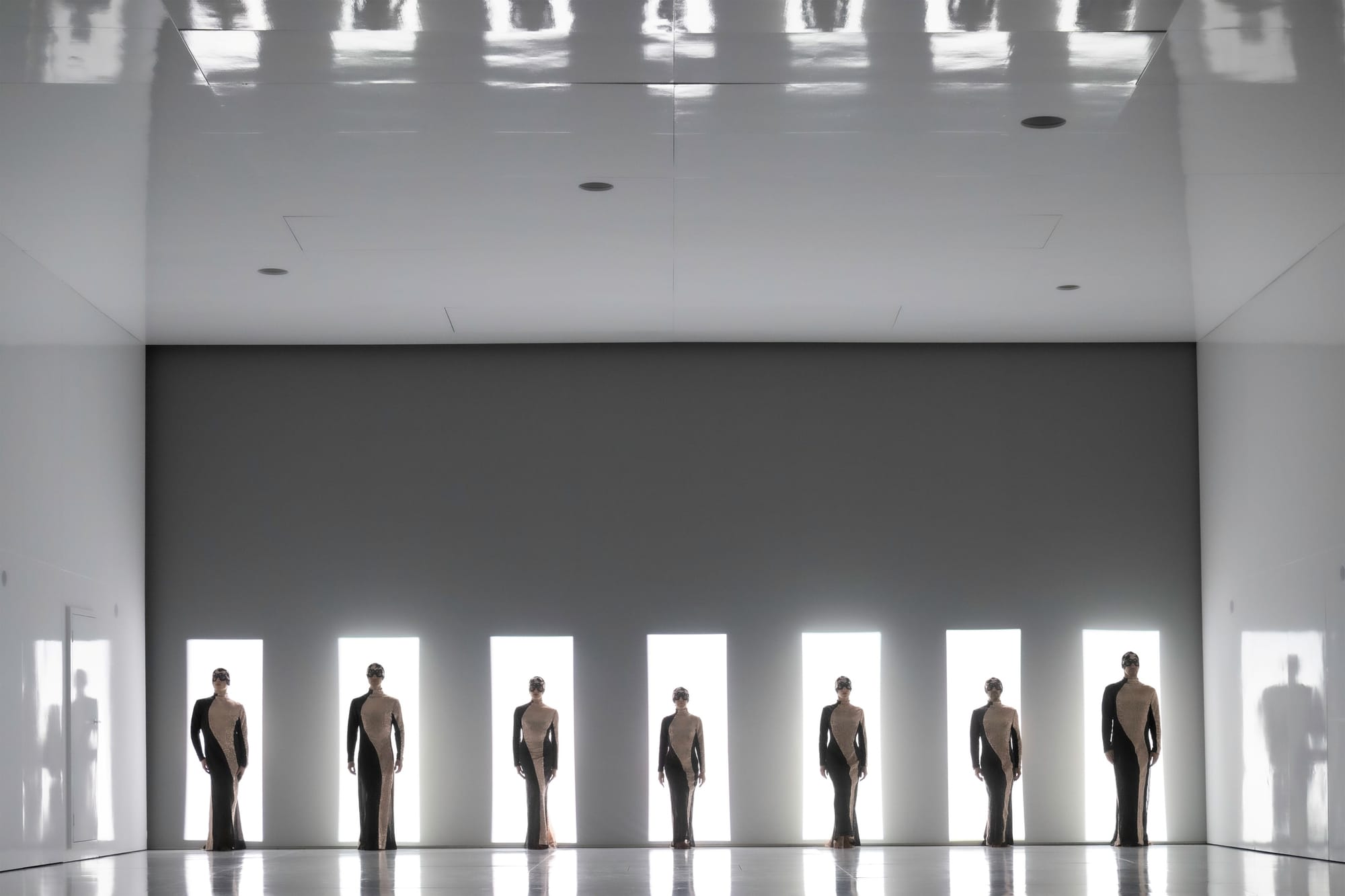
Modern Myth-Making
What’s most striking about this production is its refusal to indulge in clichéd imagery of ancient Egypt. There are no pyramids, hieroglyphs, or sand-strewn temples. Instead, sleek lighting rigs descend like skeletal temple columns, static projections fill the stage in place of stone carvings, and a hearse rotates onstage where a Nile barge might traditionally appear. The result is a world untethered from time—one where myth, ritual, and modernity collide.
Costuming furthers this tension: the royal family’s lavish silhouettes and bold colours dominate the space, while the ensemble blends into a stark, uniform mass. At times, distinctions blur—dancers join the chorus in sweeping ritual scenes, while singers adopt the sharp, vogue-like choreography usually reserved for the dancers. It’s an intentional blending of function that underscores the monotony of the crowd against the glaring isolation of the rulers, from whom all colour (and power) seems to radiate.
Lighting shifts between blinding brightness and dreamlike dawn, with moments of visual overload where the entire stage flickers under projected static—a potent symbol of societal collapse beneath the weight of radical change.
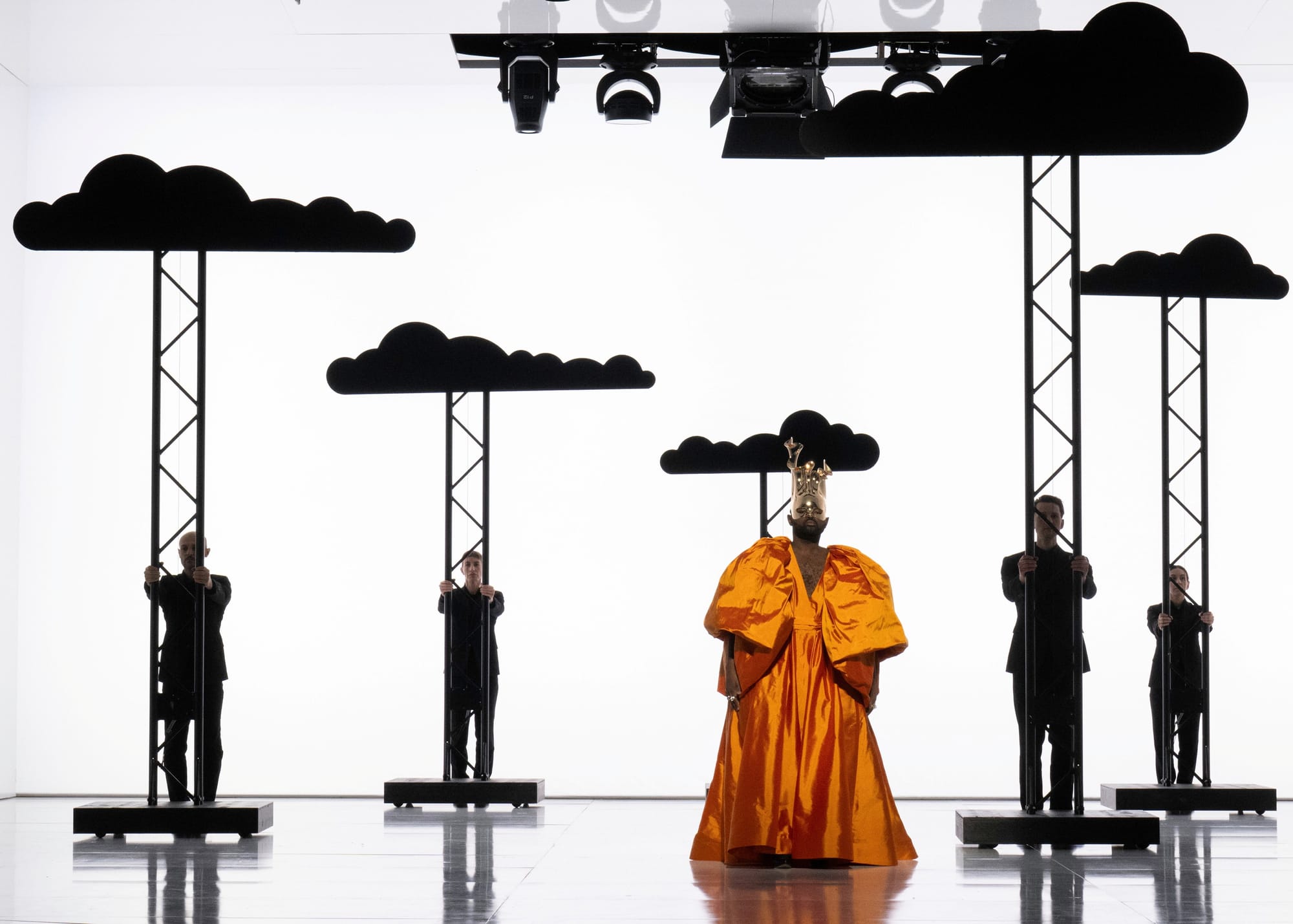
Religion as a Tool for Power
While Glass envisioned Echnaton as an examination of religious revolution, I read it more as a study in political power and its manipulation of faith. Akhnaten’s monotheism is less a spiritual awakening than a calculated restructuring of political order—a way to consolidate control by rewriting the divine narrative. The production visualizes these shifting power dynamics with precision, showing not only the rise of a new regime but also the resulting political oppression and societal fractures that lead to its downfall.
In the end, Echnaton is less concerned with historical fidelity than with exploring how societies react when foundational structures are dismantled overnight, and under force. It’s a ritualized cautionary tale about the dangers of radical change imposed from above, where religion serves as a means to an end rather than an end in itself.
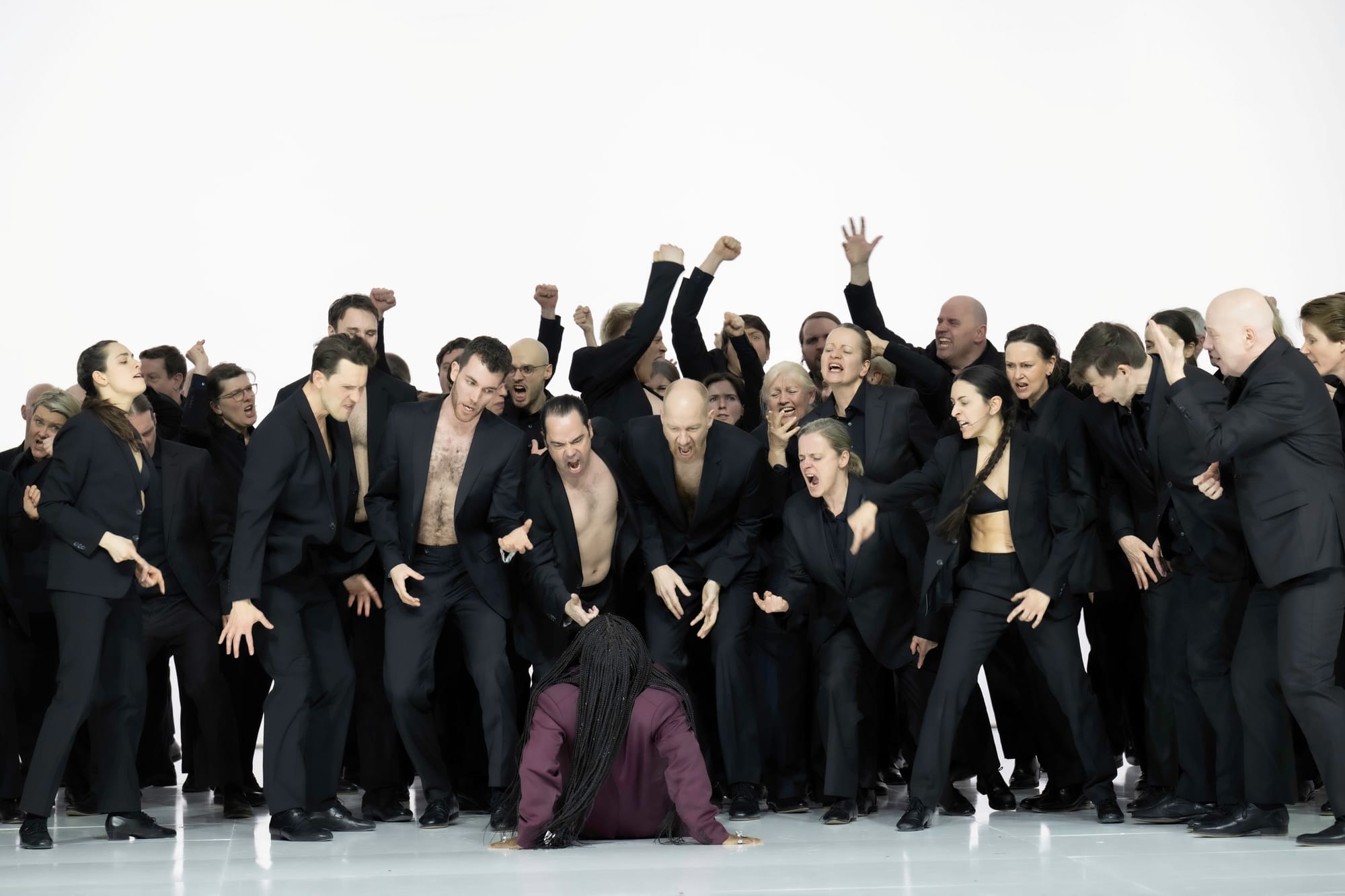
Final Reflections
By the end of Echnaton, the new order lies in ruins. We are introduced to the remnants of Akhnaten's short-lived capital from the perspective of a tour guide from our own time, now little more than archaeological fragments. The static has faded, the colour has drained, and the once-divine ruler is no more than a discarded silhouette. Yet the echoes remain: in the pulsing loops of Glass’s score, in the choreography that dissolves distinctions between body and voice, and in the haunting question the opera leaves behind—how much change can a society bear before it breaks?
That question feels uncomfortably relevant today. After four decades of unprecedented globalization, neoliberal restructuring, and (mostly) progressive social reform, much of the Western world now finds itself in the grip of backlash. Economic precarity, cultural disorientation, and political polarization have made reactionary answers seductive again. Like the society around Akhnaten—forced to adapt overnight, stripped of familiar structures, silenced in ritual submission—we, too, are reckoning with the costs of transformation without consensus, and the dangers of ignoring the slower rhythms of lived experience. The result isn’t revolution, but fracture—and we have a long way to go before we recover.
This is not opera for easy consumption. It doesn’t move with narrative urgency or emotional clarity. Instead, it asks for surrender: to sound, to symbolism, to slow transformation. I’m still not sure whether the music has entirely taken hold of me—but the experience, total and immersive, is unforgettable. In a personal week of opera defined by excess and tradition, Echnaton stood apart: cerebral, stylised, and utterly uncompromising. A modern ritual for a world still reckoning with the cost of reinvention.
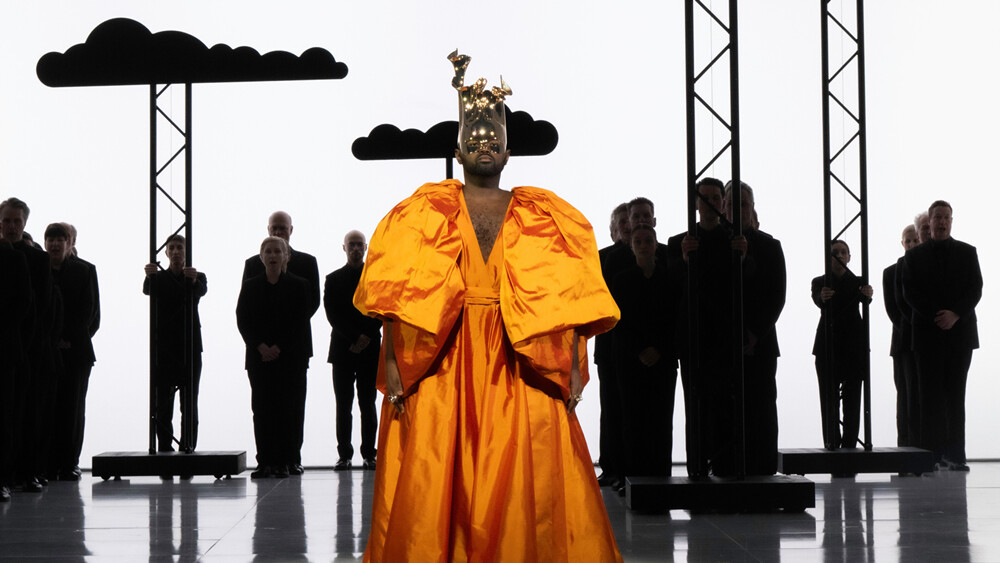
Cast
Musical direction: Jonathan Stockhammer
Production: Barrie Kosky
Staging: Klaus Grünberg, Anne Kuhn
Costuming: Klaus Bruns
Movement sequences: Barrie Kosky, Claudia Greco, Martina Borroni, Danielle Bezaire, Andrii Zubchevskyi, Shane Dickson, Benjamin Gericke, Danilo Brunetti
Dramaturgy: Daniel Andrés Eberhard
Choirs: David Cavelius
Light: Klaus Grünberg
Echnaton/Akhnaten: John Holiday
Nofretete/Nefertiti: Susan Zarrabi
Queen Teje: Sarah Brady
Horemhab: Noam Heinz
High priest of Amun: Stefan Cifolelli
Aye: Tijl Faveyts
Chronicler: Peter Renz
Dancers: Benjamin Gericke, Shane Dickson, Danilo Brunetti, Andrii Zubchevskyi, Danielle Bezaire, Martina Borroni, Claudia Greco
Akhnaten's daughters: Ambar Arias, Annette Hörle, Hannah Kretschmer, Camille Frank, Katrin Hacker, Paula Rummel, Katharina Thomas, Lea Maria Koch, SaeEum Jang, Anna-Lisa Gebhardt, Dominika Koscielniak, Katrin Le Provost, Sophia Linden
Chorsolisten der Komischen Oper Berlin / Vocalconsort Berlin
Orchester der Komischen Oper Berlin
